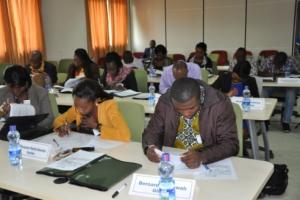International Training on Malaria Control Underway in Addis Ababa
Malaria has put an estimated 3.3 billion people – 40% of the world population – at risk, killing 584,000 people worldwide, 90% these in Africa.
The World Health Organization (WHO), in collaboration with the Ministry of Health and the Ethiopian Public Health Institute (EPHI), has organized a six-weeks training for health practitioners working on Malaria to update and equip them with the necessary skills to plan, manage and implement malaria control programs, and to facilitate networking and knowledge sharing among countries to control this deadly disease. The training brought together 35 participants from 14 African countries.
Dr. Esther Aceng-Dokotum, WHO Ethiopia Communicable Diseases Team Leader, said at the opening of the training that WHO has given due attention to skilled manpower for malaria prevention and control in its Global Technical Strategy 2016-2030. She added that the African governments are not only talking about reducing and eliminating malaria but also acting on it and committing themselves to the common goal. She also mentioned that within the coming weeks, African officials will be in Ethiopia to consult on the malaria elimination framework.
Dr. Amha Kebede, EPHI Director General, appreciated the global effort to control and eliminate malaria and expressed Government’s strong commitment to mobilize resources to fight malaria and sustain the successes so far registered. Elaborating on the achievements, Dr Amha stated, “The number of malaria cases reported in health facilities have decreased by 67%, the number of cases admitted to health facilities has gone down by 48%, malaria related deaths in health facilities were reduced by 55%, malaria admissions and death of children younger than five years fell by 81% and 73%, respectively.”
To sustain the gains, Ethiopia has developed a new National Malaria Strategic Plan (2015-2020), which mainly focuses on further reducing malaria-related burden and eliminating malaria in low-transmission settings.
The use of long-lasting insecticidal nets, indoor residual spraying of houses, reducing or eliminating mosquito breeding through environmental management in the community, and prompt treatment in nearby health facilities are among the malaria prevention and control methods that the participants will cover in detail during the training.
Ethiopia has mobilized 38,000 health extension workers, and distributed 70 million long-lasting insecticidal nets. Mosquito breeding sites have been drained, filled and cleaned; provision of malaria test kits has improved, and health education messages have been disseminated.
For more information, please contact:
Technical Contact: Dr Worku Bekele; email: workub [at] who.int (workub[at]who[dot]int)
Communication Contact: Biniyam Wubshet Fisseha; email: fissehab [at] who.int (fissehab[at]who[dot]int)






